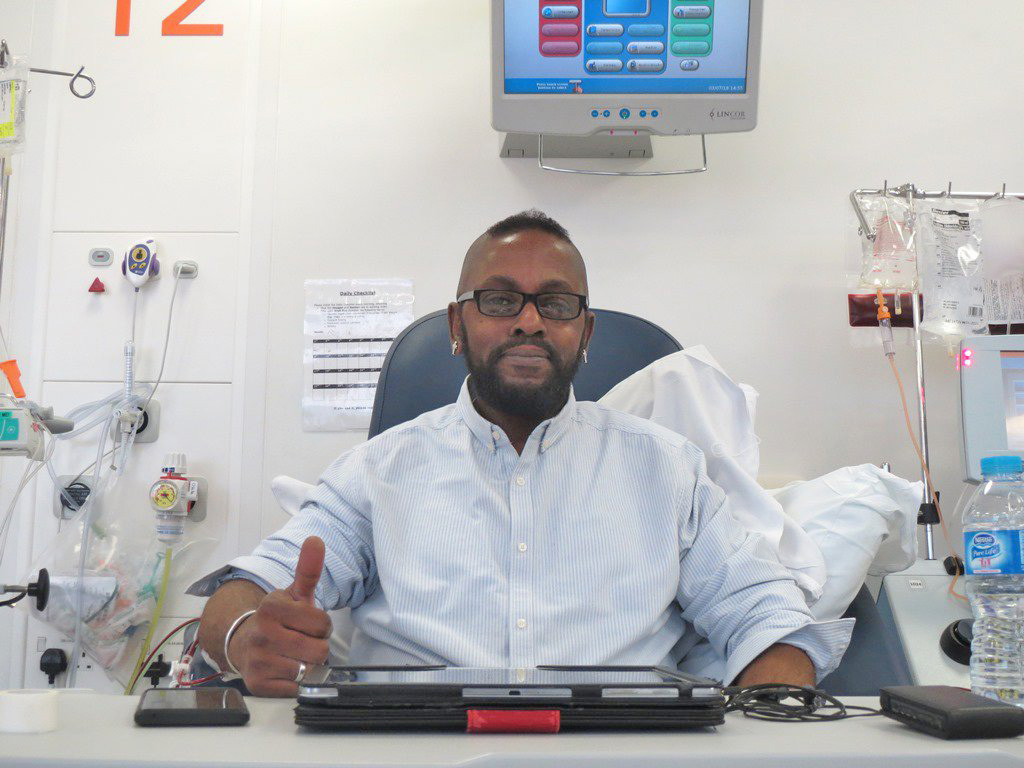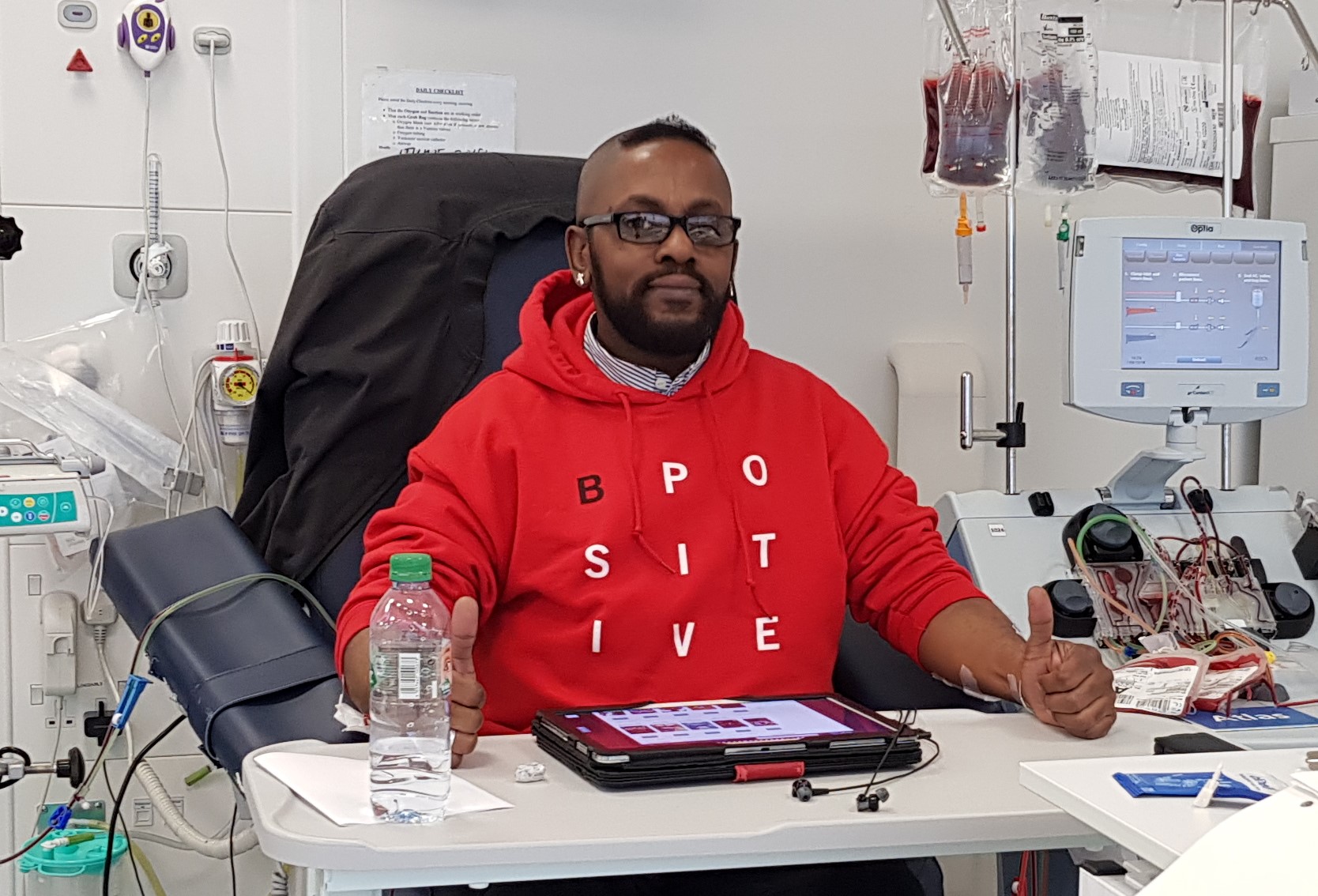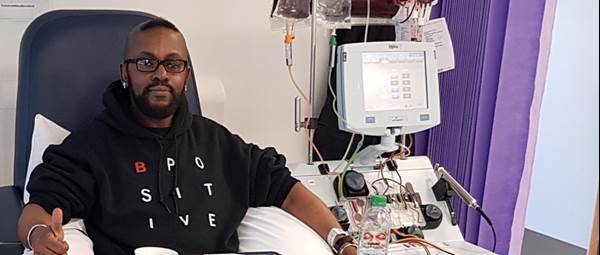It takes 128 people a year to keep me alive
Calvin was diagnosed with sickle cell disorder at just six months old and holds the record – at two years and eight months – of the longest inpatient stay at University College London Hospital.
 I’ve spent an inordinate amount of time in hospital. My daughter didn’t even realise that I lived in the same house as her until she was six, because she thought the hospital was where I lived.
I’ve spent an inordinate amount of time in hospital. My daughter didn’t even realise that I lived in the same house as her until she was six, because she thought the hospital was where I lived.
I was diagnosed with sickle cell at just six months old and every day of my life since I was born, I have been in pain.
(Image: Calvin receives red cell exchanges)
As a child and teenager, living with sickle cell was incredibly difficult and caused me no end of problems. I was always unwell, in constant pain; I spent huge amounts of time in hospital and, due to complications, came close to passing away on several occasions. I was completely blind for more than three years. It was incredibly hard, not only for me, but for my family too, as being in constant pain and going from one problem to another was incredibly stressful on all.
The impact on my family didn’t stop when I was young: it has been devastating on my children and on my partner, who have had to see me go through terrible things at times and pain that was indescribable. They have had to watch me going from one medical crisis to another and being in and out of hospital. I was sick so much of my children’s lives and they couldn’t see me for long periods of time: when I had leg ulcers, I spent almost three years in hospital. Those leg ulcers lasted ten and a half years. I was paralysed from the chest down for almost three years. It was many years before I could do all the things I would normally be able to do. Fortunately, my health has not had the same impact on my grandchildren as it had on my children.
I had blood transfusions intermittently when I was very unwell as a child. I then started having regular transfusions or exchanges when I was about 16 years old. These regular red cell exchanges are probably the single most important thing keeping me alive and out of hospital more than I otherwise would be. Every four weeks, I receive 10 to 11 units – that’s around 128 units a year.
Prior to my exchanges, I am very often extremely tired and in a lot more pain than usual, but three to four days after I start feeling the benefits. I get a boost in energy and most of the time a decrease in pain too.
These regular red cell exchanges are probably the single most important thing keeping me alive
Many people with sickle cell disorder have the Ro subtype. This is because sickle cell more commonly affects people from black ethnic backgrounds where the Ro subtype is more common.
Many sickle cell patients require ongoing blood transfusions, sometimes for the rest of their lives. If a patient with sickle cell disorder is Ro, ideally they should receive blood of the same subtype. There has been an increase in the number of people with sickle cell and as a result, the demand for Ro blood has grown.
Were it not for amazing blood donors, who I will never probably meet, I would not be here today. I owe my life to date to their incredible gifts. My family and I are so grateful for each person who donates and saves up to three adults, like myself, with each donation. Without their incredible donations, my children would not have a father and my grandchildren would not have a grandfather.
 In spite of everything I have been through, I have still managed to achieve a lot.
In spite of everything I have been through, I have still managed to achieve a lot.
Chief among those achievements is my amazing family: I’m so proud to have helped to raise two incredible children, who have both had children of their own, giving me and my partner four grandchildren with another on the way.
(Image: Calvin receives 10-11 units of red cells every four weeks)
At the same time, I have also been able to draw on my experience to help others with sickle cell and Thalassaemia, setting up my own support group, Red Cells R Us, which offers a welfare fund and help with benefits for those who are struggling with bills or short-term money issues. Most importantly, we offer advice as well as a place for people to meet and chat and organise evenings out and activities, helping people feel less alone and isolated.
My role within NHS Blood and Transplant, as Senior Community Engagement Coordinator, is one I take very seriously. I feel that my life experience gives me a very unique perspective in carrying out my role. It gives me an advantage that is most definitely a benefit to the organisation in raising awareness of both blood donation and sickle cell. It is important that potential donors understand why blood donation is important and what it means to people with sickle cell.
Were it not for amazing blood donors, who I will never probably meet, I would not be here today.
I also sit on the board of the cancer charity, Haematology Cancer Care Trust, at UCLH London, as well as various panels at other hospitals and trusts in and around London. Alongside MPs and field experts I sit on the All Party Parliamentary Group with the aim of helping to progress treatment and research into sickle cell and Thalassaemia, including writing the patients standards which were passed into law a few years ago.
You’ll also find me singing tenor in the B Positive Choir. In 2018, we sang at the MOBO Awards ceremony and got to the live finals of Britain’s Got Talent and have since sang for the Royal Family on a couple of occasions and performed overseas, including twice in America.
It takes 128 people a year to keep me alive. Every achievement I make, I make with hundreds of blood donors standing beside me.

Sickle cell and blood transfusions
Blood transfusions can make a huge difference to people with sickle cell
Book your appointment online
Book now
Other stories
Remarkable stories from the world of giving blood – be they from the research lab, the hospital bed, or the donor chair
